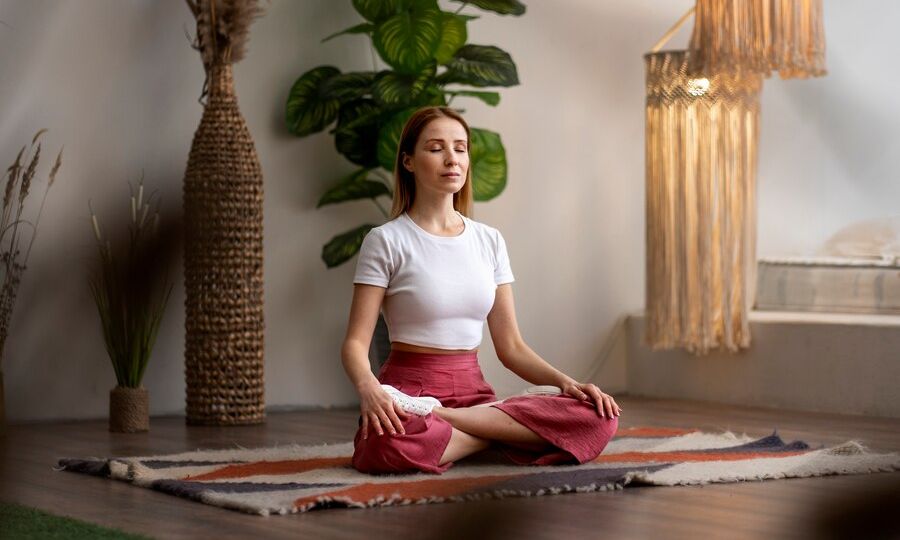yoga
History:
types of yoga:
- Hatha Yoga: Focuses on physical postures and breath control to prepare the body for meditation.
- Vinyasa Yoga: Involves a flow of postures synchronised with the breath.
- Ashtanga Yoga: A rigorous style involving a specific sequence of postures linked by breath.
- Bikram Yoga: Consists of a set sequence of 26 postures practiced in a heated room.
- Kundalini Yoga: Aims to awaken the kundalini energy at the base of the spine through postures, breath control, and chanting.
benefits of yoga:
- Physical Health: Improves flexibility, strength, and balance; enhances cardiovascular health; aids in weight management.
- Mental Health: Reduces stress and anxiety; improves mood and overall mental well-being.
- Spiritual Growth: Promotes self-awareness and inner peace.
meditation
Meditation is a practice where an individual uses techniques such as mindfulness, focusing the mind on a particular object, thought, or activity to achieve a mentally clear and emotionally calm state.
history
Meditation has been practiced for thousands of years in various forms and across different cultures. It is a key component of many religious and spiritual traditions, particularly in Hinduism, Buddhism, and Taoism. The practice of meditation has evolved over time and has been integrated into modern secular contexts for mental health and wellness.
Types of Meditation:
- Mindfulness Meditation: Focuses on being present in the moment and observing thoughts and sensations without judgment.
- Transcendental Meditation: Involves the use of a mantra to settle the mind into a state of restful alertness.
- Loving-Kindness Meditation: Aims to cultivate an attitude of love and compassion towards oneself and others.
- Zen Meditation (Zazen): A seated meditation practice that emphasizes mindfulness and concentration.
- Guided Meditation: Involves listening to a guide or teacher who leads the meditation process.
Benefits of Meditation:
- Mental Health: Reduces stress, anxiety, and depression; enhances focus, concentration, and emotional regulation.
- Physical Health: Lowers blood pressure; improves sleep quality; boosts the immune system.
- Spiritual Development: Fosters a deeper sense of self-awareness and spiritual growth.
The Transformative Power of Yoga: A Journey to Inner Peace
Yoga is a profound practice that transcends mere physical exercise, offering a holistic path to inner peace and personal transformation. By integrating breath control, meditation, and physical postures, yoga helps to harmonise the mind, body, and spirit. Practitioners often experience enhanced flexibility, strength, and vitality, but the benefits extend far beyond the physical realm. Regular yoga practice can lead to a heightened sense of self-awareness and emotional resilience, helping to alleviate stress and anxiety. Through mindful breathing and meditation, yoga cultivates a state of mental clarity and tranquillity, allowing individuals to connect with their inner selves and foster a deep sense of peace.
Holistic Integration of Mind, Body, and Spirit
Yoga transcends mere physical exercise, offering a comprehensive approach that harmonizes the mind, body, and spirit through breath control, meditation, and physical postures.
physical benefits
Regular yoga practice enhances flexibility, strength, and vitality, promoting overall physical health and well-being.
Emotional Resilience and Stress Relief
Yoga helps alleviate stress and anxiety, fostering emotional resilience through mindful breathing and meditation.
Mental Clarity and Tranquility
The practice cultivates a state of mental clarity and tranquility, allowing individuals to connect with their inner selves and achieve a deep sense of peace.
Self-Awareness and Spiritual Growth
Through its meditative aspects, yoga encourages self-awareness and spiritual growth, leading to a more balanced and centered approach to life.
Overall Well-being
The journey of yoga promotes holistic well-being, transforming practitioners by helping them embrace a peaceful, contented, and harmonious existence.


